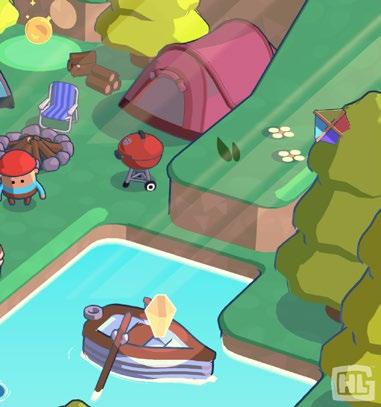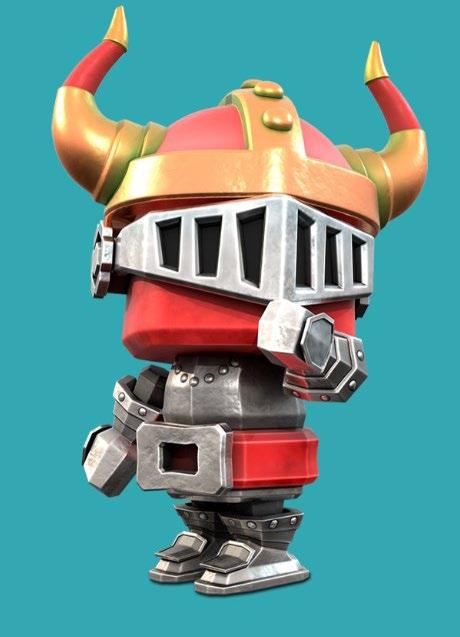
6 minute read
Building the Impossible
Rob Madden (class of 2009) has built a company that defies expectations. In the fierce digital world, he has dared to be different.
Valued at £150bn in 2020 the video game industry is now larger than both the film and music industries combined, and the budget for new games often runs into tens of millions of pounds. Formerly derided as ‘geeky’ and ‘uncool’, geeky is most definitely now cool.
It is an industry filled with fledgling studios, with lifespans shorter than players on a 1980’s arcade version of Space Invaders and where the attrition rate is as scary as the working practices. Impending deadlines, known as ‘crunch time’, often mean 20-hour days and sleeping in the studio for weeks on end to get a project over the line. It is male-dominated and the titles reflect that, heavily themed towards male sensibilities, shooting everything in sight (often with a bazooka) and driving far too fast seem to be unsurprisingly popular.
Dux in Computer Studies (the W.E. Crichton prize) Rob went on to gain a Master’s Degree in Games Development from Abertay’s celebrated computer games department. Relatively speaking, so far, so normal.
But Rob and his co-creators decided to do things differently and the result is a workforce that is 40% female and nothing more than a 35-hour working week is expected.
I met Rob at the Hyper Lumina Games studio in Dundee’s Greenmarket. With expectations shaped by reading too much Douglas Copland I was disappointed that no one was riding around on a scooter, engaging in a Nerf war or munching bowls of sugary American breakfast cereals at lunchtime. It looked like a well-appointed modern office with little to indicate (other than a big sign on the wall) that it was a games studio. On closer inspection the computers and their screens were high end and there was the odd energy drink on display, but it was a long way from the expected ‘lads palace’.
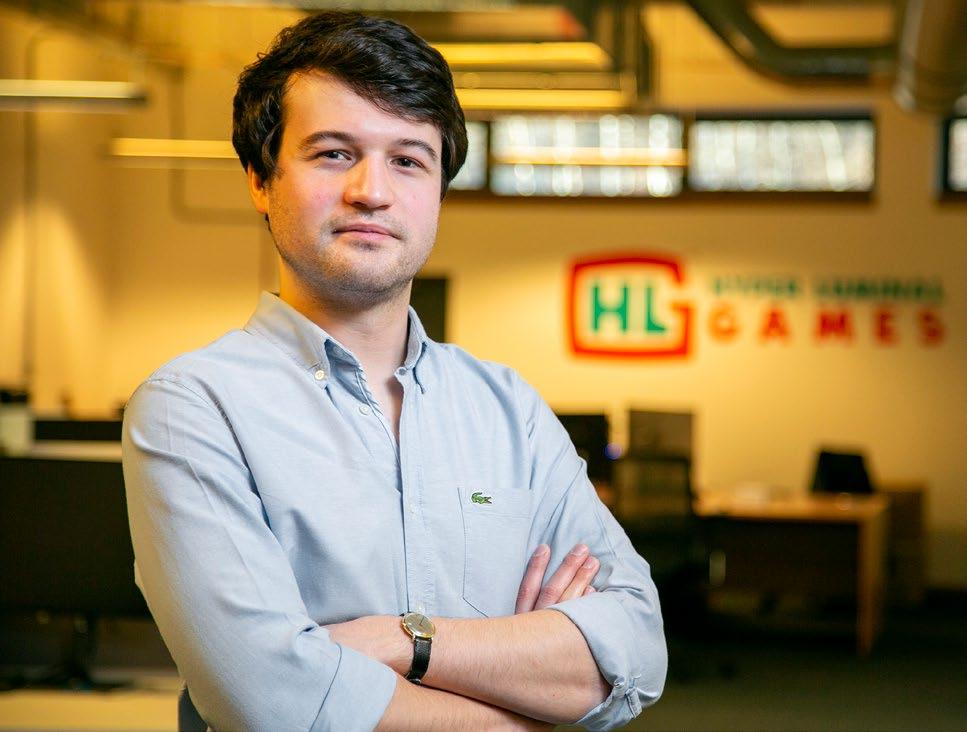
The very first game I remember playing was Laylat Wars on the Nintendo 64. That was the first game and console I ever owned. I think that was definitely a lightbulb moment because I'd never really played anything like that before and I still play it every now and again.
I've always loved games and wanted to do something in the industry. And then I watched a documentary about the making of the game Halo, which I had played a lot of. When a guy’s name and title came up on screen ‘vehicle designer’, this was a revelatory moment – so that guy goes into work and builds the vehicles for the game? I realized people sit down and build this stuff. I never really thought about it before, games just existed. I guess they fell from the sky. I realised there’s a career there, I can go and be one of these people. Abertay was, and still is, the best place to study games-specific courses and it just happened to be over the road from the school. So, I was like, cool, guess that works.
Influenced by cool films and with a leaning towards sci-fi and horror, touchstones include Dune (2021, not the 1984 abomination) and Arrival, with a definite nod towards director
Denis Villeneuve. Stranger Things also gets a mention as does Hereditary and Midsommar by Ari Aster.
I love film, particularly in horror genre. But there's a lot of modern ones where it's just about how to make people jump. Relic was a good film which was ultimately all about dementia.
I love media that has something to say, that's what our games are all about as well. Pine Hearts (to be released in 2023) is essentially all about loss. It's about overcoming grief. But it's communicated in this way that’s colourful and bright. It’s a little adventure/puzzle game and on the surface, you might not think too much of it. But the more you play it, you start to feel theme and undertone, there's an actual subtext, it’s a lot more meaningful and we put a lot of thought into that.
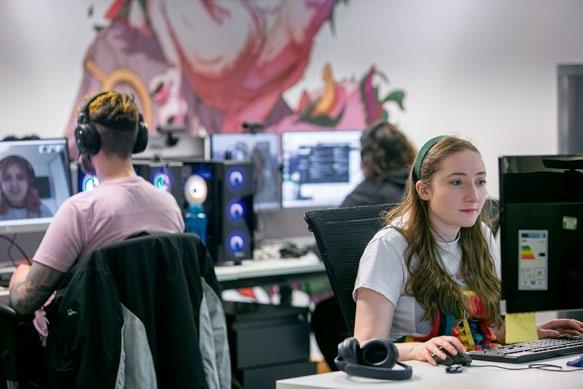
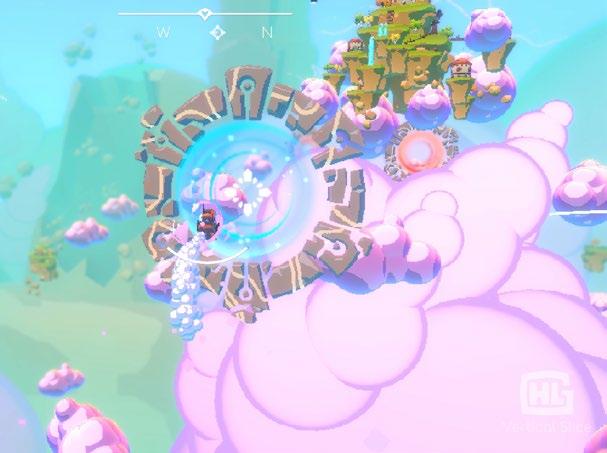
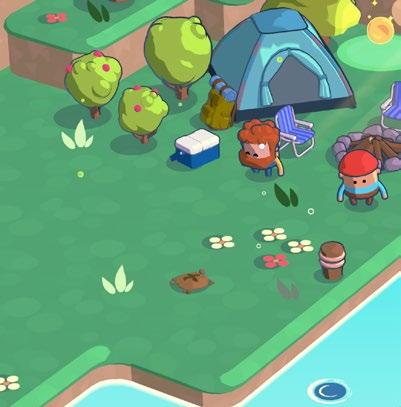
Midsommar, a horror story set in a Scandinavian midsummer festival, is an illuminating choice. The plot centres on a deteriorating relationship, with the inspiration coming being a breakup that writer/director Aster himself experienced. Rob has also drawn from personal experience.
I lost my dad to cancer just a couple of years ago, very sudden, just six weeks, he was diagnosed and then gone. It was a pivotal moment in my life. I want to make games with a greater sense of purpose where they can tell a story, something meaningful. So, Pine Hearts is about a little boy called Tyke [who] goes back to the caravan park where he used to spend summer holidays with his dad and relives memories. He learns from those memories and overcomes challenges so there's a through line of learning to cope with loss in a positive way. It’s all about having people that are important to you, although they're gone, they pass things on to you through experience of memories, I felt that was an important thing to do. Every game that we make should in some way communicate something more, there needs to be something that underlies and underpins.
But I wouldn't want to get to a point where games are so hung up on trying to be art that they stop being enjoyable, that’s not what I want to see. There are definitely people who are leagues ahead. Naughty Dog are the biggest pushers of that, the Last Of Us games are not even just games anymore. The storytelling is just so far beyond what a lot of others can do because they have about one thousand people working for them, the best people.
The wholesome games market is more concerned with how people feel rather than what the gameplay mechanics are. That's a really big step, games often get hung up on mechanics. You don't say I'm going to watch a first-person film or a dolly camera film. You say I'm going to see a romance film or I'm going to see a comedy or a horror. Games will take that step, where it becomes an art form because it's more concerned with emotion than mechanics.
It's a constant battle of creativity versus business sense and that's why Stewart (our CEO) and I work so well together because he's very business focused, not money driven, conscious of how we can make our spend more efficient. We started in 2014 and didn't release our own first game until 2018, we spent four years doing work for hire, establishing ourselves as a business. How do we run successfully? How do we employ staff? How do we create good working practices? How do we skill people up? We have three or four big clients that each have two, three, four years of work, so we have that established pipeline of work for hire. We know our revenue for the next while, that provides a huge amount of security for us to then be creative and try new things and build games. And they don't have to be stand out hits, they can do [just] okay and it won't be a problem, we’ll break even or make a little profit. But we still have a profitable work for hire business over here as well. A lot of local studios don't do that. They come out of university ‘we just want to build our own game’ and they do that for a year, then ‘we have no money’ and they just close and they’ve never done anything.
Working for hire, making games for publishers, is like ghost writing an autobiography where you don’t get the credit and are tied to non-disclosure agreements. But there was one game he could talk about.
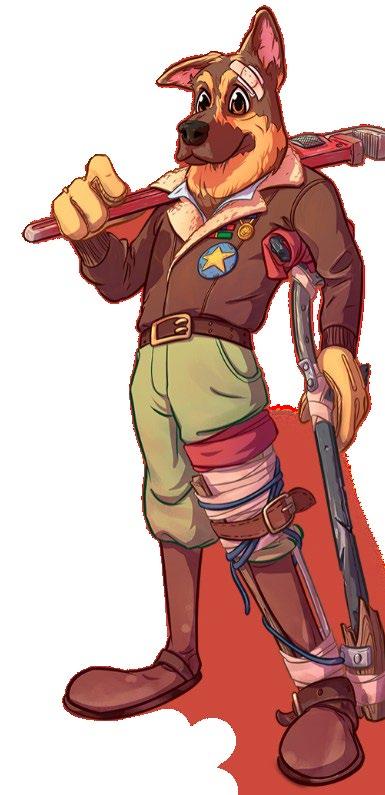
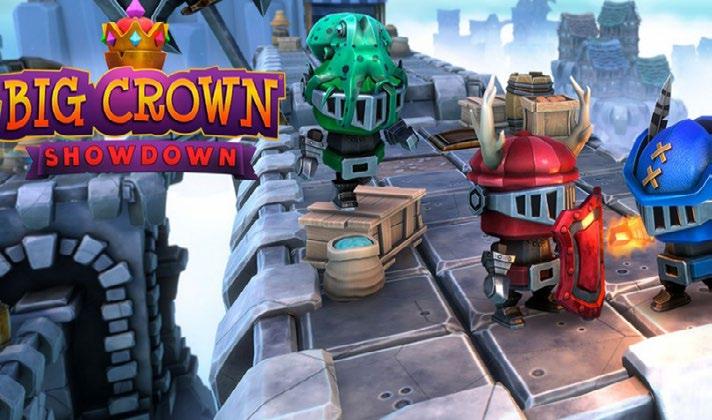
Venture Valley’s been developed with an American charity called the Singleton Foundation for Financial Literacy, who focus on improving financial literacy in the US. They wanted this game built that teaches people how to run businesses and be sensible with their finances, they're not games focused at all, but they wanted to use games to teach. So, we worked with them to build a game. Often mission statements are meaningless, the result of an away day where people only remember the evening activities involving sumo suits, copious sake and karaoke. Gathering intellectual dust they serve no more purpose than to adorn reception area walls. Hyper Luminal have put theirs on the website. It stands boldly to hold them to account, and so far they seem to be doing more than just ok.
Hyper Luminal is an indie games studio based in Dundee, Scotland.
Everything we make is inspired by our ambition to build high quality games that create lasting memories and fill our team with pride.
